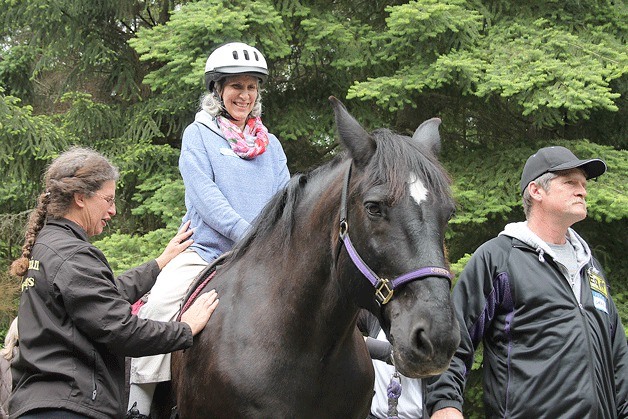Swedish Medical Center patients suffering from multiple sclerosis began a therapeutic horseback riding program in Greenbank last week. The first day went smoothly, and the initial results were powerful.
There were poignant moments for patient Maria Peccorini, whose multiple sclerosis has limited her mobility and caused a loss of feeling in her lower half. She was anxious to ride, which she believed was huge since one of her main conditions is multiple sclerosis fatigue. Yet the best moment was saved for last, as she felt a sensation in her hips that she hadn’t felt in some time.
“I haven’t felt my hips in decades!” Peccorini said. “I have my hips back! When you haven’t felt your hips in decades and you suddenly do, it’s amazing. I can’t really describe it.”
Equestrian Crossings hosted the research and riding session at the Rein Shadow Arena in Greenbank. Multiple sclerosis patients from Swedish Medical Center in Seattle made the journey from the Emerald City as part of the hospital’s new wellness program that provides therapy through engaging activities such as music, art and horseback riding. Research is being conducted by occupational therapists from Swedish Medical Center in the six-week program.
Depending on their findings, this could lead researchers to seek grant money to extend their studies on therapeutic riding for multiple sclerosis patients.
The research session is the brainchild of Langley resident Catherine Cesaro, who herself receives treatment for her multiple sclerosis at Swedish Medical Center. She is also on the board of directors for Equestrian Crossings and owns two horses, one of which is a therapy horse.
Studies on the impact adaptive horseback riding can have on multiple sclerosis patients are quite rare. “Adaptive” riding is the term used for riding that enables those with physical or mental conditions to ride with varying levels of assistance.
Equestrian Crossings uses ramps to help patients and riders climb onto the horse, with volunteers also assisting them. During riding sessions, “sidewalkers” accompany the rider to prevent falls and talk the rider through the motions.
According to Equestrian Crossings volunteer coordinator Gail Corell, there are only a few programs in the United States that have participated in this kind of research. The significance riding can have on patients, however, is visible, she said.
“On a mental level, it relaxes stress and anxiety and provides stability,” Corell said. “Riding for people with physical ailments helps with mobility because a horse’s walk mimics human walking. The movements stimulate the brain and muscles, makes patients more mobile and relaxes the muscles which is huge for multiple sclerosis patients.”
Horseback riding also builds core strength, as riders need to balance themselves as the horse moves its legs. Most importantly it stimulates the nervous system, which is essentially eaten away by the potentially disabling disease. Nervous systems tend to improve and renew after horseback riding, Correll said.
“One of the goals of adaptive riding is working on posture,” said Swedish Medical Center occupational therapist Simon Gale, who is conducting the research. “The patients have to balance themselves on top of the horse, often with little assistance if they can manage. Many struggle to balance at first, but as they continue to ride you can just tell that they grow more comfortable and confident in their abilities.”
One of the most important aspects of adaptive riding is the sensation riders experience when they make it to the top of the towering horse.
The patients’ faces light up after the climb, often in disbelief. To have limited mobility, but sitting atop a massive 1000-pound animal is huge, according to Corell. Some laugh joyously, some shed tears.
“The whole thing is so incredibly supportive and there is nothing negative I can say about it,” Cesaro said. “It keeps me going. It’s given me confidence to realize I can ride despite the cards I’ve been dealt.”



